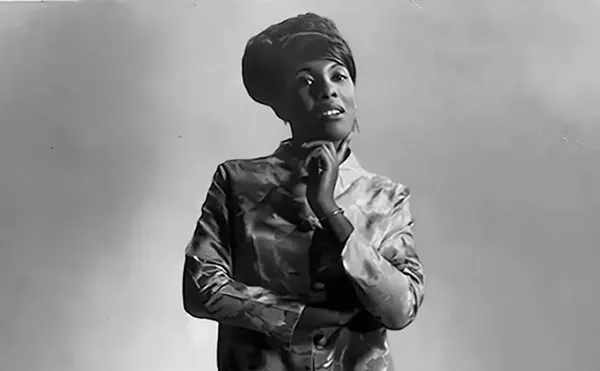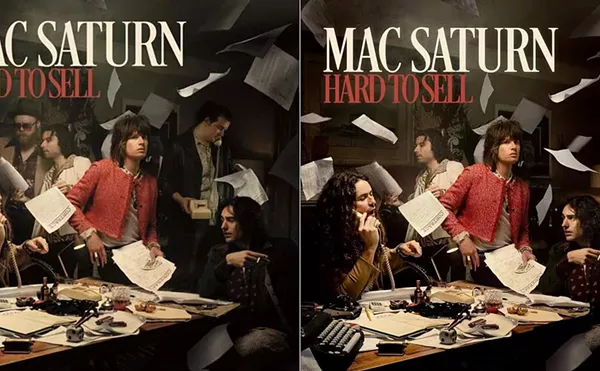
Audio By Carbonatix
[
{
"name": "GPT - Leaderboard - Inline - Content",
"component": "35519556",
"insertPoint": "5th",
"startingPoint": "3",
"requiredCountToDisplay": "3",
"maxInsertions": 100,
"adList": [
{
"adPreset": "LeaderboardInline"
}
]
}
]
The San Francisco-based musical troupe Caroliner rests easy in the pantheon of visionary American musicians. Connect the dots from The Anthology of American Folk Music to Sun Ra to Blind Joe Death to the Residents to recordist Michael Siegel's legendary Folkways record The Sounds of the Junkyard, and you've just made it to the outskirts of the Caroliner camp. In the troupe's creaky and freaky music, fabricated myths of 1800s Americana meet the absurd wing of the avant garage sale. Caroliner members are bizarre-tists and oddballs' oddballs, the kind of people you believe when they say that they were "raised up listening to bad banjo players and locomotive trains for music."
Behind pseudonyms that change from album to album, tour to tour and interview to interview, the half-dozen or so arty, noisy individuals in Caroliner have been creating one of the great outsider musical acts of our times. As a Caroliner spokesperson who gave his name this time around as Gumfry Pumple Possession says, "A lot of effort goes into every aspect of this band. It's one of those craft fairs that comes around once a year that takes meticulous planning and a lot of effort on everybody's part, making it a gestalt, wholesome thing, like a big handful of wheat."
About 10 years ago, Caroliner's first album, Rear End Hernia Puppet Show, began to appear in specialty record shops. Thus the pattern was set for subsequent Caroliner releases. Each of the troupe's records (Caroliner is pretty much a vinyl-only band) has homemade packaging, ranging from hand-painted envelopes to fabric remnants to all sorts of unique found-object collages. Each contains a meticulous lyric sheet, delineating the group's surrealist word assemblages, parables and tall tales. And each album is credited to Caroliner -- well, the name Caroliner followed by the word "Rainbow" and an ever-changing string of poetically non-sequiturial words. Two of many examples: Caroliner Rainbow Horsemeat Selling Roses, and the oddly appropriate Caroliner Rainbow Wire Thin Sheep Legs Baking Exhibit. (But please, it's Caroliner for short, not Caroliner Rainbow -- Don't ask.)
And then there's the music. Caroliner presents a sonic smorgasbord that stretches traditions from scratchy alien blues stomps to electronic bubbling. Grungy dirges that sound like a coonskin cap version of the band Flipper clear the way for banjo-drone hoedowns. Machine sound collages mix with echoing piano innards, all in a swirl of ghost-town dust and pump organ oddness. Throughout it all, wrong-speed vocals intone the Caroliner librettos, in a range that stretches from frog-croak to helium-flutter. The specter of Captain Beefheart raises its trout-masked visage in Caroliner's radical reinterpretations of traditional sounds, as well as the Magic Band-esque pseudonyms wielded by those making the sounds: Vests of Skin, the Hundred-Mile Banner Man, the Indian Tongue-Wink.
Caroliner has cultivated a creation myth that makes Sun Ra's claims of extraterrestrial origin sound positively down-to-earth. As Mr. Possession explains the meaning behind the moaning, "Caroliner is the singing bull of the 1800s, kind of like an early-on cassette recorder. It would go from mining camp to mining camp, and it would go to various town meetings and stuff. People would sing to it, and it could repeat the songs back. A complete bevy of American history put into its ear, the songs and situations of the Old West, and it would take those songs around from place to place."
The Bay Area has a grand tradition of wacko cultural conceptualists, the most infamous being the Residents. Those savvy pranksters laid down the gauntlet for the do-it-yourself-in-an-alternate-reality set ever so many years ago. As one of only a few bands to rise to that challenge successfully, Caroliner remains nonchalant when compared to the famous eyeball-donners. The Residents? "Oh, local, yeah," Mr. Possession coolly remarks. However, when talk turns to that treasure trove of raw musical Americana, The Anthology of American Folk Music, Possession heats up like he has a hotfoot. He exclaims in his Caroliner hyperbolic word stew, "Absolute toilet-treasure of the year! That's the best thing that came out of the sewer and ate the whole world. That's the best thing anyone could invest in. People are selling their garnered legs to get that booger out of the Smithsonian."
In particular, Mr. Possession waxes poetic about the titanic banjo-picker Dock Boggs: "Dock Boggs, a human gods (sic). If dried-up turnips were able to sing given the gift of frog vocal cords and super talent backwards banjo-playing, that would be a description of Dock Boggs."
Actually, that would be a Caroliner description of Boggs, one of the members' patron saints.
If all of this sounds strange, imagine what it looks like. Surreal sculptural scenery of indeterminate function saturates the Caroliner stage. Often it's even difficult to determine where the scenery ends and the band members begin, as the performers' unwieldy costumes are cut from the same creative cloth as the props. Bathed in black light, the Caroliner handiwork basks in all of its Day-Glo glory. And, perhaps most amazing of all, Caroliner recreates the rickety tunesmithery of its 10 albums. It's not a noisefest, but a carefully composed collection of abstract expressionist folk songs from an alternate universe.
The Caroliner universe finds the pioneers of electronic music shaking hands with the pioneers of history textbooks. The troupe's mythic American individualism stands as rugged and proud as the leather-bound covers of the Time-Life Old West Library. And that's pretty proud, partner. Greg Baise was last seen driftin' along with the Day-Glo, papier-mache, tumblin'





